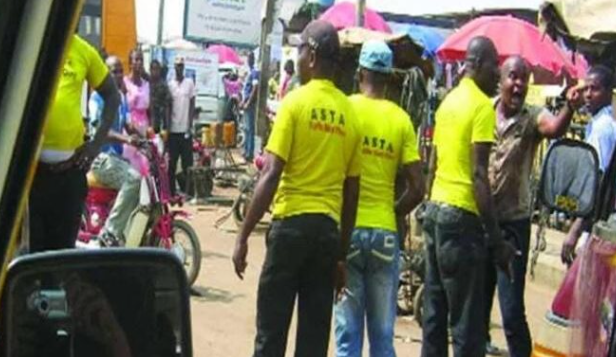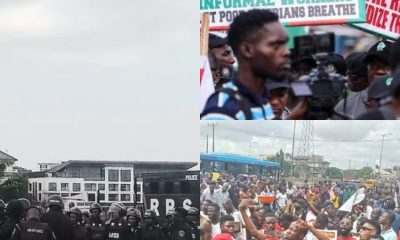News
Angry mob sets two revenue collectors ablaze in Anambra

By Kayode Sanni-Arewa
An angry mob has reportedly set ablaze two yet-to-be-identified revenue collectors of the Anambra State Government for causing a tipper driver to ram and kill a bystander at the Old Market Road along Venn Road by Egerton Bus Stop in Onitsha, Anambra State.
The incident, which occurred on Friday, caused confusion, thereby leading to gridlock in the area.
Eyewitnesses near the scene said the tipper driver lost control of the vehicle and rammed into the bystander as the revenue touts were dragging the steering of the vehicle with him.
According to sources, the revenue collectors were chasing the tipper driver over a payment they wanted him to make before he rammed into the man.
One of the sources said, “There was chaos in Onitsha as an angry mob set ablaze about two revenue touts, while four others were lucky as they managed to escape. The revenue collectors, numbering about six were chasing the tipper driver over a certain amount they asked him to pay.
“As they were chasing him, some of them were dragging the steering with him, but unfortunately, in the process, the tipper driver lost control and rammed into a passerby, killing him instantly.
“Immediately, the revenue collectors saw the damage they had caused; they tried to flee the scene, but the Onitsha mob got angry and descended on them, setting ablaze two of them instantly while four of them managed to escape.
“This is one death too many that has been going on in Anambra in the last two years. The person who the tipper driver rammed into was a known person. We cannot continue like this anymore. These revenue touts of the state government have killed more Ndi Anambra than non-state actors.”
Another source and a trader in the area also said, “Onitsha was hot this morning at Egerton by Old Market Road. Revenuemen were dragging steering with a tipper driver because he refused to bribe them, and in the process, the vehicle ran over an innocent man.
“Then, seeing the result of their stupid action, they tried to run away. But the angry people chased and caught two of them and set them on fire.”
The videos of the incident showing the burnt corpses of the revenue collectors have been making the rounds on social media to corroborate the story.
The Chairman of the association, Ebuka Unekwe, who also confirmed the development, lamented that the revenue collectors have been a pain on the neck of tipper drivers in the last two years.
When contacted on the development, on Saturday, the Anambra State Police Command’s spokesman, SP Tochukwu Ikenga, confirmed the development, saying the police have responded swiftly to bring the situation under control.
He said, “Anambra Police responded swiftly on the receipt of the fatal accident that happened within that area.
“We are already working with the relevant authorities to ascertain what happened and find an amicable solution to such, especially on future occurrences.
News
BREAKING! Finally, White Smoke Emerges From Sistine Chapel as Vatican Elects New Pope

Finally, white smoke emerged from the Sistine Chapel on the evening of Thursday, May 8, signalling that the Vatican has elected a new Pope. The cardinal selected to succeed Pope Francis will be announced in due course.
On Wednesday, 133 cardinals entered the chapel for a deeply choreographed ritual that has preceded the election of every Pope since 1179. The first session started with a vow of secrecy—excommunication awaits anyone who leaks details of the votes—followed by the vote.
Once the numbers were tallied, the votes were burned in a special stove set up inside the chapel. Yesterday’s black smoke informed the public that the cardinals had yet to make their decision.
The papal conclave is a centuries-old process with modern-day consequences.
Francis’ 12-year pontificate was pivotal, not just for the church, but for the globe. His advocacy for care of migrants and the poor, his tolerance for homosexuality, and his denunciation of climate change and conflicts in Gaza and Ukraine helped reset the world’s moral compass.
Yet within the church, his reformist interpretation of church doctrine—”Who am I to judge?” he famously responded when asked to weigh in on gay priests—set off a polarizing struggle between modernists and traditionalists. So too has his big tent inclusivity that welcomed practitioners of all kinds, and invited many of them, even members of the LGBTQ community and lay women, to sit with bishops and contribute their thoughts on the direction of the church in meetings called synods. It is this vision of synodality—the church as a listening one instead of a top-down enforcer of doctrine—that is at the core of Francis’ progressivism, and the biggest threat to traditionalists who want to maintain the power and influence of bishops and cardinals.
Every conclave, at its most fundamental, is a referendum on the previous pope’s legacy. Behind closed doors and sworn to secrecy, the cardinals will have had to decide if the new pope is one to continue on Francis’ radically inclusive path, or someone who will roll back his policies in favor of a more inward-looking church focused on doctrine.
That will have repercussions in a tense historical moment of religious and ethnic strife exacerbated by conflict, climate change, rising nationalism and anti-migrant sentiment are coming to the fore, says Alberto Melloni, a Vatican historian who is the director of the John XXIII Foundation for Religious Sciences in Bologna, Italy. There are relatively few global figures who can move opinion, drive conversation, and call for change like a pope. “It will be very different if we have a pope who is more worried about ideological topics of tradition than someone who makes the unity of the human family and care for the planet the first point in his agenda,” says Melloni.
There are 252 cardinals, but only those under the age of 80 took part in the conclave. Of the 133 cardinals that voted, Francis appointed 108.
Over the past several years, Francis sought to elevate bishops from underrepresented places such as Myanmar, Rwanda, and East Timor to the college of cardinals to better represent the scope of global Catholicism. Coming from wildly varying cultural backgrounds, they do not align on any consistent ideological spectrum. Many of them are more conservative on issues of homosexuality and women, even if they embrace Francis’ focus on other kinds of inclusivity. That made for a very unpredictable vote, says Melloni. “It is not liberals vs. conservatives. It is not donkeys and elephants facing one another across the aisle. It is a collage of people divided into very small groups,” aligned by theological leanings, doctrinal philosophy, or missionary experience.
Given the stakes, the competing agendas, and the constantly shifting micro alliances and priorities, it was impossible to predict from the outset who will ultimately get support from two-thirds of a very divided electorate, faced with one of the most, if not the most, important decisions of their career. “The only thing we can say with any confidence is that we’ll have a male pope,” says Melloni, when pressed to hazard a guess for the outcome ahead of the papal election.
Most of the politicking has already been done, conducted in private over informal meetings and at dinners in the nearby guesthouse where the cardinals stay. Overt campaigning is frowned upon, but it is not uncommon for trusted “kingmaker” cardinals to push for the candidates that share their values and vision for the church.
Once a papal election starts, the cardinals cannot leave the conclave except in rare cases, and they are cut off from the rest of the word, with no access to phones, the internet or even newspapers (the word conclave comes from the Latin “with key,” as in, locked up.)
Inside the chapel, the electors share a brief prayer and take an oath to observe the sanctity of the process before handwriting the name of their chosen candidate on a piece of folded paper. One by one, the cardinals will deposit their votes in a special urn. Once voting is done, the votes are tallied, then burned.
News
Reps To Host National Summit On Security Over Plateau Killings

At the same time, the lawmakers also called on the President to take immediate steps by deploying security forces to the most affected areas, particularly Bokkos and Bassa—and to extend protection to other communities at risk.
Lawmakers also pressed for urgent humanitarian action, as relief items were requested for those caught in the crisis, and the ministry responsible for humanitarian matters was told to design a long-term recovery plan for the devastated villages.
This decision came after a motion was raised by Rep. Daniel Asama, who stressed the need to act swiftly. He pointed out that people living in and around Jos, especially in Bokkos and Bassa have endured wave after wave of attacks.
He painted a grim picture: “Families torn apart, homes burned down, farms abandoned, and entire communities uprooted. He insisted the violence must end and the displaced must be supported before the situation worsens.
News
Rep Push For Construction Of Additional Camps for NYSC Participants In States

-

 Entertainment13 hours ago
Entertainment13 hours agoI’m broke yet accused of money laundering – VDM breaks silence after EFCC release
-

 News22 hours ago
News22 hours agoJust in: Finally, EFCC bows to pressure, releases VDM
-

 News5 hours ago
News5 hours agoBreaking: Three Serving PDP HoR Members Defect to APC
-

 News13 hours ago
News13 hours agoEdo police rescue kidnapped PDP chairman, 36 others
-

 News13 hours ago
News13 hours agoTomato Ebola Causes Loss of N1.3 Billion, Contributing to Rising Food Prices
-

 News13 hours ago
News13 hours agoSad! Five members of one family die of food poisoning
-

 News6 hours ago
News6 hours agoFinally, IMF deletes Nigeria from its debtors list
-

 News4 hours ago
News4 hours agoEx-Governor Uduaghan, Daughter Dump PDP, Join APC


















